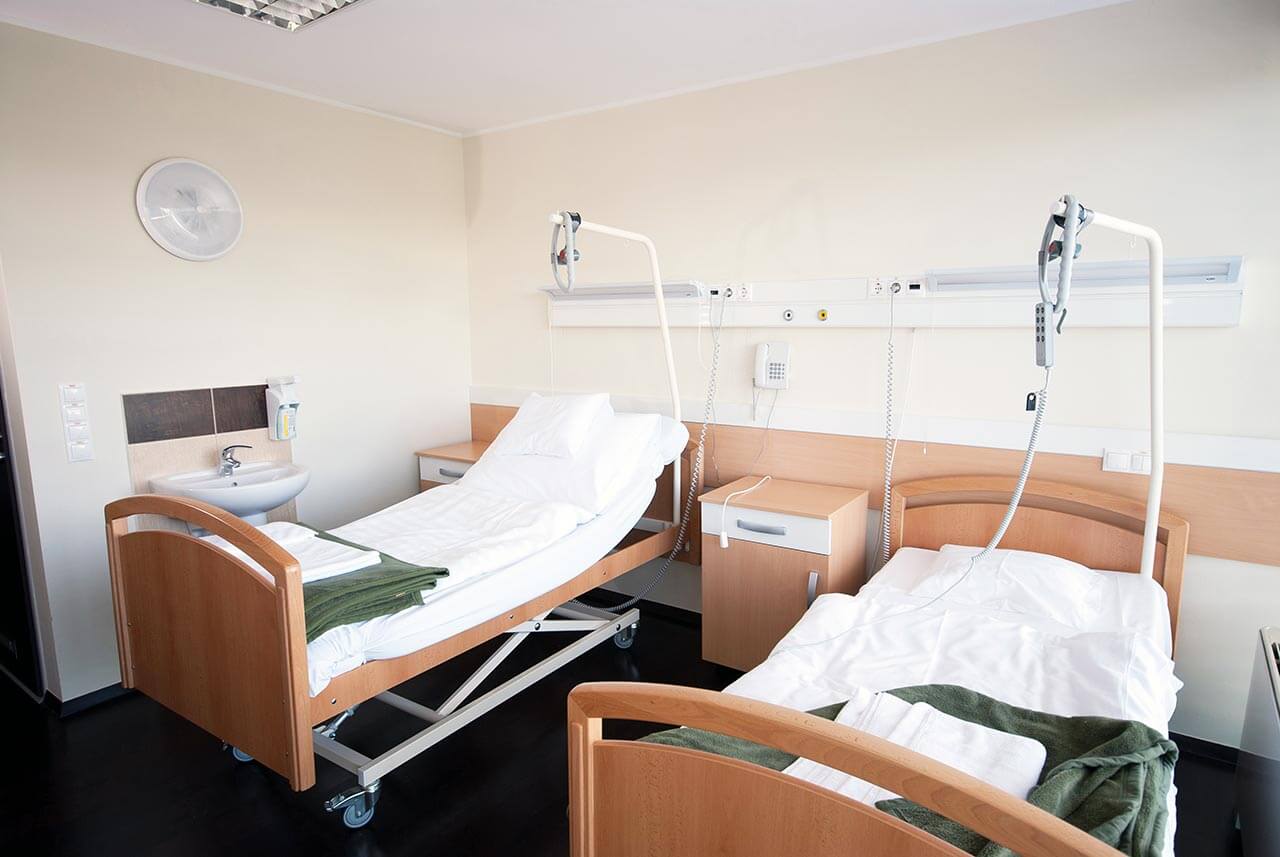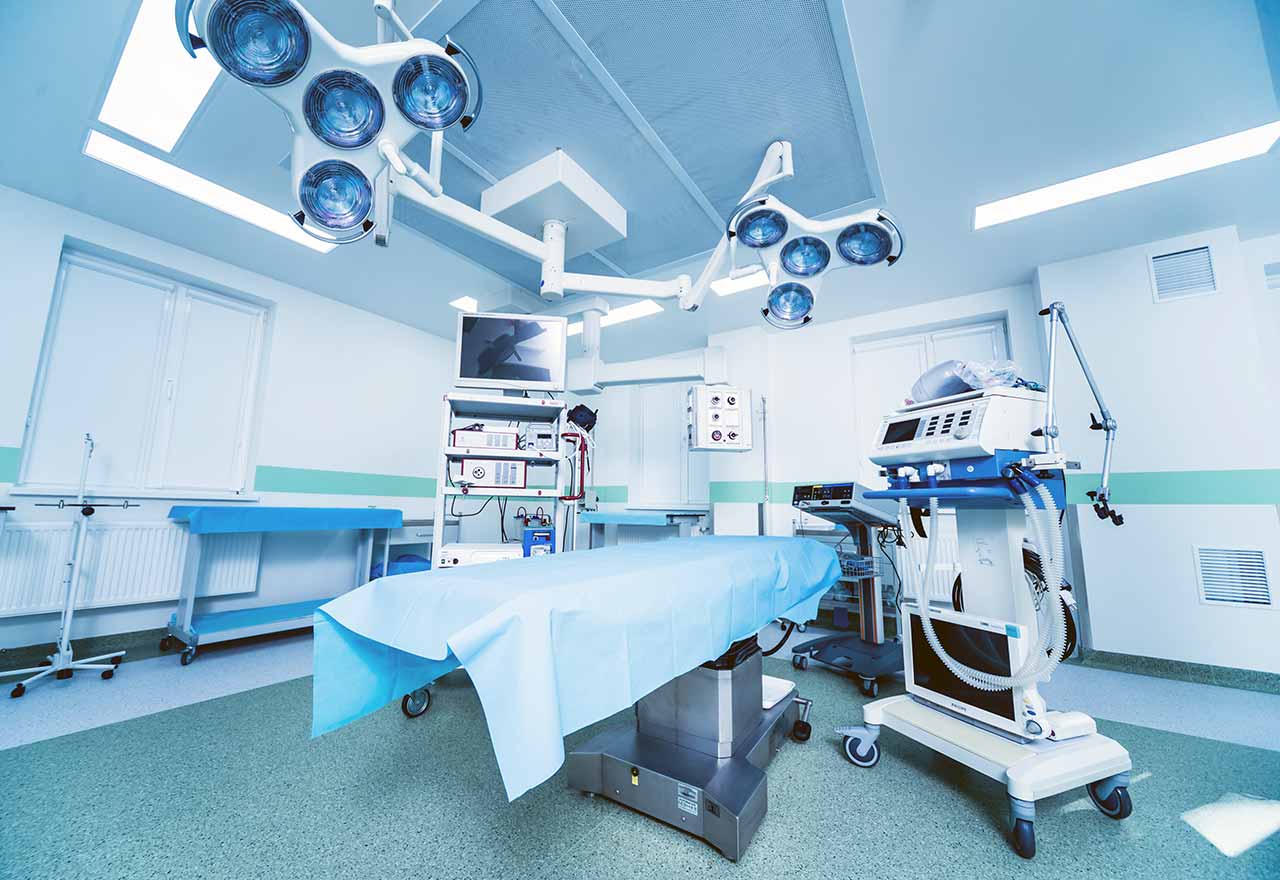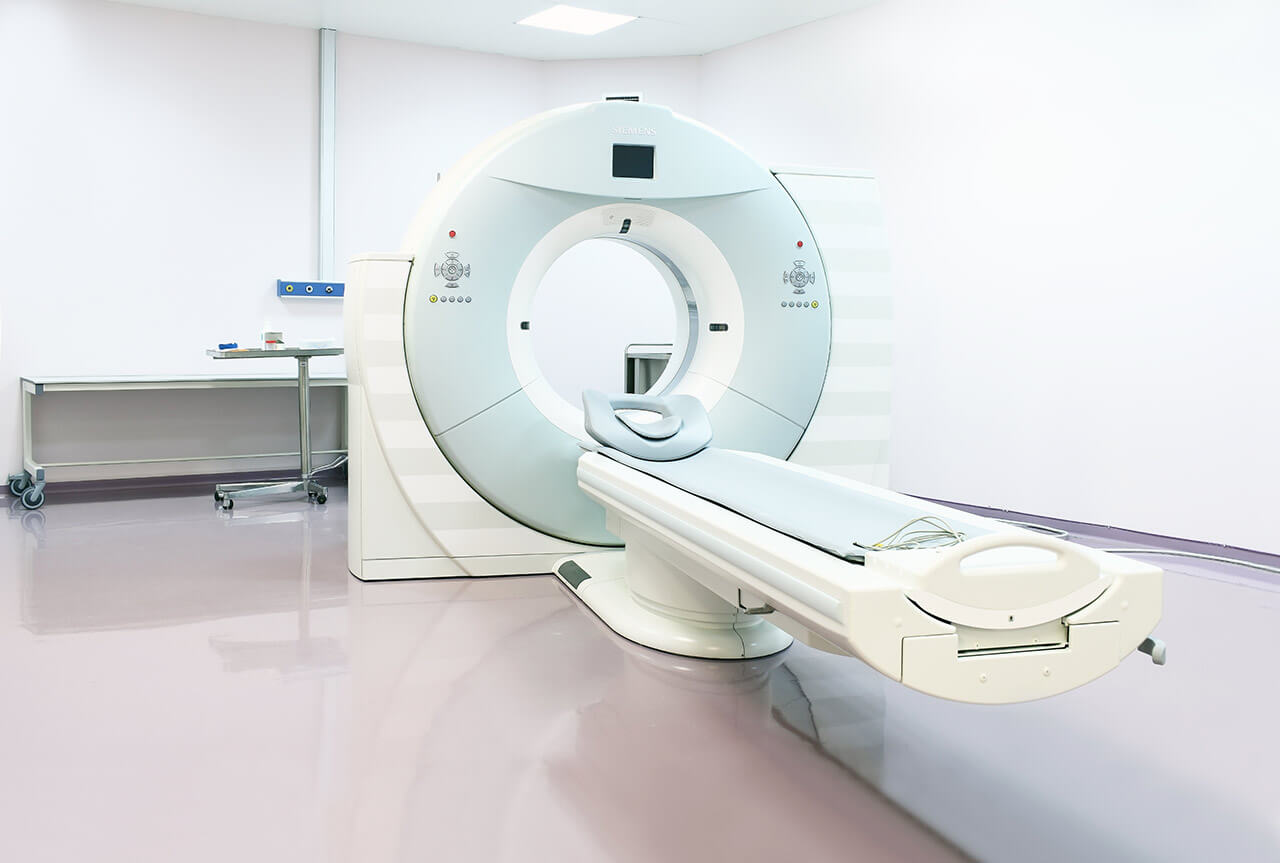
The program includes:
- Initial presentation in the clinic
- clinical history taking
- review of medical records
- physical examination
- laboratory tests:
- complete blood count
- general urine analysis
- biochemical analysis of blood
- TSH-basal, fT3, fT4
- tumor markers
- inflammation indicators (CRP, ESR)
- indicators of blood coagulation
- abdominal ultrasound scan
- CT scan/MRI or PET-CT of abdomen
- preoperative care
- cytoreductive surgery to remove visible tumors
inside the abdomen and HIPEC - histological and immunohistochemical
examination of removed tissues - symptomatic treatment
- cost of essential medicines
- nursing services
- stay in the hospital with a full board
- accommodation in a 2-bedroom ward
- elaboration of further recommendations
How program is carried out
During the first visit, the physician will conduct a clinical examination and go through the results of the available diagnostic tests. After that, you will undergo the necessary additional examination, such as the assessment of liver and kidney function, ultrasound scan and tomography of the abdominal organs. Based on the results of the examination, the physician will choose the surgical technique and the type of anesthesia. After that, preparation according to the preoperative standard will start.
Cytoreductive surgery begins with general anesthesia. The intervention is performed as open surgery, i.e. through the incision in the anterior abdominal wall, so that the surgeon can carefully examine the peritoneum and the surface of the abdominal organs. The surgeon removes affected by the malignant process areas of the colon and peritoneum, metastases in other internal organs. This stage of the operation can take several hours, since the overall effectiveness of the treatment depends on the completeness of the malignant tissues removal.
At the next stage of the operation, the surgeon inserts several catheters into the abdominal cavity. Through the catheters, a heated solution of a chemotherapy drug is pumped inside. The special system maintains the required temperature (42-43 degrees Celsius), pressure and circulation rate of the medicinal solution. The solution mechanically flushes out blood clots and remnants of malignant tissues, and a heated chemotherapy drug destroys micrometastases in internal organs and lymph nodes (micrometastases can’t be detected by the naked eye).
After 1-1.5 hours, the chemotherapy drug is removed from the abdominal cavity and the abdominal cavity is washed with saline. After that, the surgeon removes the catheters and sutures the incision of the anterior abdominal wall.
After the completion of the operation, you will be transferred to the ward of the intensive care unit, under the round-the-clock supervision of doctors and nurses. In 1-3 days after the operation, your drains will be removed and you will be transferred to a regular ward for further recovery. The whole treatment takes 10-12 days on average.
Finally, the attending physician will evaluate the results of control examinations, schedule the date of discharge from the hospital and give you detailed recommendations for further follow-up and treatment.
Required documents
- Medical records
- Esophagogastroduodenoscopy (EGD), MRI/CT scan (not older than 3 months)
- Biopsy results (if available)
Service
You may also book:
 BookingHealth Price from:
BookingHealth Price from:
About the department
According to the Focus magazine, the Department of General and Abdominal Surgery, Hernia Surgery, Colorectal Surgery at the HELIOS University Hospital Wuppertal ranks among the top German medical facilities specializing in the surgical treatment of gallbladder and biliary tract pathologies!
The team of the department's surgeons admits patients with benign and malignant gastrointestinal diseases, namely stomach, liver, esophageal, gallbladder and biliary tract, pancreatic, colon and rectal pathologies. The department also carries out treatment for all types of hernias – the medical facility has a quality certificate from the German Hernia Society (DHG). Of particular interest is the resection of malignant tumors of the digestive system. The department's operating rooms have state-of-the-art medical equipment, therefore, in most cases, surgeons can perform interventions without extensive incisions in the skin and soft tissues, but with the use of minimally invasive techniques. Such an approach to surgical treatment greatly facilitates the patient's postoperative recovery process, reduces the risk of complications and excludes severe pain syndrome. The department's surgeons cooperate closely with gastroenterologists, hepatologists, oncologists, radiologists and other doctors from related medical fields. Doctors demonstrate high treatment success rates, use advanced surgical techniques, as well as observe hygiene and safety standards. Patients can be sure that their health is in the safe hands of leading European specialists.
The department is headed by Prof. Dr. med. Hubert Zirngibl. According to the prestigious medical magazine Focus, the specialist ranks among the top German surgeons. He has long successful experience and exceptional professional skills.
The primary focus of abdominal surgeons is on surgical procedures for colon, esophageal, liver, stomach, gallbladder cancers and other gastrointestinal cancers. Such patients are treated in cooperation with gastroenterologists, oncologists, radiation therapists, chemotherapists, radiologists and other doctors of the specialized center for the treatment of a particular type of cancer. Prior to the treatment, doctors cooperatively assess the patient's examination results and develop an optimal treatment regimen based on the stage of cancer, the presence or absence of metastases, concomitant pathologies, the patient's age, etc. As a rule, the first-line therapy is surgical resection of the tumor. The department's surgeons give preference to laparoscopic and endoscopic techniques. Such interventions do not require large incisions in the abdominal wall – several incisions 0,5-1,5 cm long are enough. Surgical instruments and an optical device (laparoscope) are inserted through these incisions for transmitting images of the surgical field to a large screen in multiple zoom. The operation is complemented by conservative treatments – chemotherapy, radiation therapy and targeted therapy. Upon the completion of treatment, the patient is recommended to undergo regular follow-up examinations.
The department has an excellent reputation in hernia repair surgery. The specialists perform operations to repair inguinal, umbilical, femoral, incisional, paracolostomy and diaphragmatic hernias. Hernioplasty (hernia repair surgery) is performed using minimally traumatic surgical techniques, so patients do not need a long hospital stay, and recovery after surgery takes a few days. Hernioplasty involves the use of special meshes for strengthening the weak points of the abdominal wall and preventing the displacement of internal organs beyond its borders. The department is certified by the German Hernia Society (DHG) and works according to current clinical protocols, so patients receive an effective and modern treatment.
The department employs a specially trained team of surgeons who deal with the treatment of rectal, anal and pararectal diseases. The most common pathologies in this field include constipation, anal fissures, anal fistulas, hemorrhoids, fecal incontinence, rectal prolapse, diverticular disease, inflammatory bowel disease, as well as anal and colorectal cancer. The treatment involves the use of conservative methods and minimally invasive surgical interventions. Each patient benefits from an individual treatment regimen with an optimal set of therapeutic procedures.
The department's range of medical services includes:
- Surgical treatment of gastrointestinal cancers
- Colon cancer
- Esophageal cancer
- Liver cancer
- Stomach cancer
- Gallbladder and biliary tract cancer
- Surgical treatment of hernias
- Inguinal hernia
- Umbilical hernia
- Femoral hernia
- Incisional hernia
- Paracolostomy hernia
- Diaphragmatic hernia
- Surgical treatment of proctological diseases
- Haemorrhoids
- Constipation
- Anal fissures
- Anal fistulas
- Fecal incontinence
- Rectal prolapse
- Diverticular disease
- Inflammatory bowel disease
- Anal cancer
- Colorectal cancer
- Surgical treatment of other diseases
Curriculum vitae
Prof. Dr. med. Hubert Zirngibl is the Head of the Department of General and Abdominal Surgery, Hernia Surgery, Colorectal Surgery at the HELIOS University Hospital Wuppertal. In addition, the specialist is the Head of the Department of Surgery II at the Witten/Herdecke University. The specialist has board certification in General, Vascular and Abdominal Surgery. Prof. Zirngibl also has additional qualifications in Special Abdominal Surgery, Colorectal Surgery and Surgical Intensive Care. The priorities of the doctor's clinical activities include bowel cancer surgery, interventions on the pancreas and esophagus.
According to the Focus magazine, Prof. Hubert Zirngibl ranks among the top German doctors specializing in abdominal surgery, gallbladder and biliary tract surgery.
Photo of the doctor: (c) Helios Universitätsklinikum Wuppertal
About hospital
According to the prestigious Focus magazine, the HELIOS University Hospital Wuppertal ranks among the top medical facilities in Germany!
The hospital rightfully enjoys the status of the maximum care medical facility and provides its high-quality services in all modern fields of medicine. The hospital operates on the basis of the Witten/Herdecke University, which was opened in 1982 and today is considered one of the best in Germany. Thus, many head physicians of the medical complex are in charge of the corresponding department at the university, which contributes to the close intertwining of research activities and clinical practice. The hospital has long traditions and its own values – the main goal of doctors is to provide comprehensive medical care focused not only on curing the disease, but also on the patient's personal needs.
The hospital has 1,000 beds. The doctors of the medical facility admit more than 50,000 inpatients annually. In addition, more than 100,000 outpatients undergo diagnostic and therapeutic procedures. Such high attendance rates speak for themselves and are undeniable proof of the high-quality medical service of the European level. The medical staff of the hospital has more than 2,500 employees, whose main task is to restore the patient's health and provide him with a decent quality of life.
The hospital has more than 26 specialized departments, as well as many narrowly focused centers and institutes dealing with the treatment of patients suffering from a particular group of diseases: Breast Center, Cancer Center, Cardiology Center, Trauma Center, Spine Center and others. The primary clinical focus of the medical center is cancer treatment.
For more than 25 years, the hospital has been running a special quality management system for medical care, which regulates the aspects of work of the medical staff, compliance with hygiene and safety standards during diagnostics and treatment. Consequently, patients can be sure that their health is in the safe hands of true professionals who work in accordance with the latest medical standards.
Special attention should be paid to the honors of the hospital for excellent patient care. The medical complex has quality certificates from the German Cancer Society (DKG), the German Trauma Society (DGU), the German Cardiac Society (DGK), the German Stroke Society (DSG) and other professional German societies.
Photo: (с) depositphotos
Accommodation in hospital
Patients rooms
The patients of the HELIOS University Hospital Wuppertal live in comfortable single, double, triple and quadruple rooms. Each patient room has an ensuite bathroom with shower and toilet. The standard room furnishings include a comfortable automatically adjustable bed, a bedside table, a wardrobe, a TV and a telephone. The hospital has Wi-Fi (free). For maximum patient comfort, there is a nurse call device on the bedside table. This device allows the patient to control the TV, radio, turn on or off the lights, and adjust the position of the bed.
The patients of the hospital are also offered accommodation in enhanced-comfort rooms. These rooms additionally provide a safe and a free minibar with soft drinks. The enhanced-comfort rooms also have a spacious bathroom with hairdryer, bathrobe, towels and toiletries.
Meals and Menus
The patients of the hospital are offered three meals a day: breakfast, lunch and dinner. The menu offers a variety of delicious dishes to suit all tastes, including dietary and vegetarian options.
The hospital also has a bistro where one can taste delicious hot dishes, cold snacks, desserts, as well as a cup of tea, coffee or refreshments.
The patients staying in enhanced-comfort rooms are offered a separate menu that includes a wider and more refined range of dishes. In addition, fresh fruit, tea, coffee and desserts are delivered to the patient room every day, if desired.
Further details
Standard rooms include:
Religion
The religious services are available upon request.
Accompanying person
During an inpatient program, your accompanying person can stay with you in the patient room or in the hotel of your choice.
Hotel
During an outpatient program, you can stay in the hotel of your choice. Our managers will help you choose the most suitable options.




